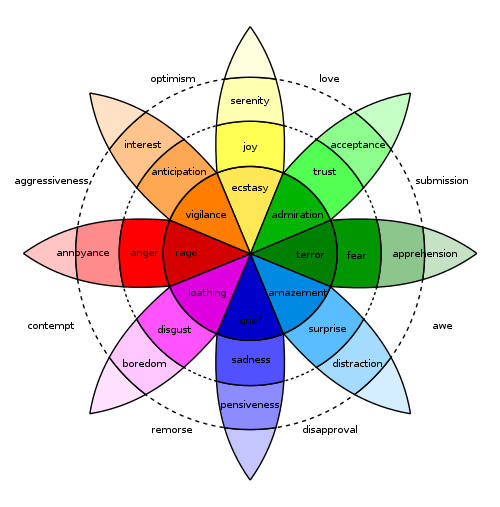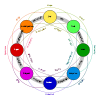Affective spectrum
The affective spectrum is a spectrum of affective disorders (mood disorders).[1] It is a grouping of related psychiatric and medical disorders which may accompany bipolar, unipolar, and schizoaffective disorders at statistically higher rates than would normally be expected. These disorders are identified by a common positive response to the same types of pharmacologic treatments. They also aggregate strongly in families and may therefore share common heritable underlying physiologic anomalies.
Types
Affective spectrum disorders include:
- Attention deficit hyperactivity disorder[2][3]
- Bipolar disorder
- Body dysmorphic disorder
- Bulimia nervosa[2][3] and other eating disorders
- Cataplexy[2][3]
- Dysthymia[3]
- Generalized anxiety disorder[3]
- Hypersexuality
- Irritable bowel syndrome[2][3]
- Impulse-control disorders
- Kleptomania
- Migraine[2][3]
- Major depressive disorder[2][3]
- Obsessive-compulsive disorder[2][3]
- Oppositional defiant disorder
- Panic disorder[2][3]
- Posttraumatic stress disorder[3]
- Premenstrual dysphoric disorder[3]
- Social anxiety disorder[3]
- Fibromyalgia[3]
The following may also be part of the spectrum accompanying affective disorders.
- Chronic pain
- Intermittent explosive disorder[4]
- Pathological gambling
- Personality disorder
- Pyromania
- Substance abuse and addiction (includes alcoholism)
- Trichotillomania
Also, there are now studies linking heart disease.[5]
Many of the terms above overlap. The American Psychiatric Association's definitions of these terms can be found in the Diagnostic and Statistical Manual of Mental Disorders (DSM).
See also
Footnotes
- Renato D. Alarcon; William G. Walter-Ryan; Patricia A. Rippetoe (1987). "Affective spectrum disorders". Comprehensive Psychiatry. 28 (4): 292–308. doi:10.1016/0010-440X(87)90065-4. PMID 3608463.
- Hudson JI, Pope HG Jr (1990). "Affective spectrum disorder: does antidepressant response identify a family of disorders with a common pathophysiology?". Am J Psychiatry. 147 (5): 552–64. doi:10.1176/ajp.147.5.552. PMID 2183630.
- Hudson JI, Mangweth B, Pope HG Jr, De Col C, Hausmann A, Gutweniger S, Laird NM, Biebl W, Tsuang MT (1990). "Family study of affective spectrum disorder". Arch Gen Psychiatry. 60 (2): 170–7. doi:10.1001/archpsyc.60.2.170. PMID 12578434.
- McElroy SL, Soutullo CA, Beckman DA, Taylor P Jr, Keck PE Jr (1998). "DSM-IV intermittent explosive disorder: a report of 27 cases". J Clin Psychiatry. 59 (4): 203–10. doi:10.4088/jcp.v59n0411. PMID 9590677.
- Fenton WS, Stover ES (2006). "Mood disorders: cardiovascular and diabetes comorbidity". Curr Opin Psychiatry. 19 (4): 421–7. doi:10.1097/01.yco.0000228765.33356.9f. PMID 16721175.

